Fleurs du Mal Magazine


Or see the index
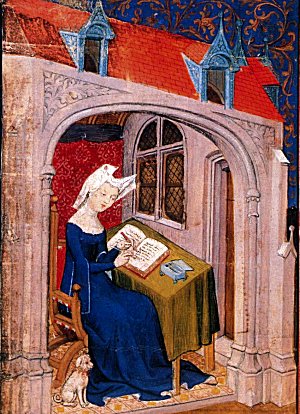
Christine de Pisan
(ca 1364-1430)
BALLAD
Ah, Death, Death, Death, to thee I make my prayer!
Come, rend me from this dolorous world apart!
Life lures no longer: since my lady fair
Would have me shun her, let my hapless heart
Be very prey to pain and sorrow’s sword.
Gladness I leave and all delight for aye,
And thee alone, O Death, have I implored
Because my lady hath bidden me good-bye.
Alas, alas, what doleful news is there!
Never to knight assailed with glaive or dart
Came heavier trouble than the woes I share,
I, who have gathered up in shame and smart
An evil greater than I may record:
Since now my love from all adventure high
Must needs withdraw, and death be my reward
Because my lady hath bidden me good-bye.
Ah, lady of mine, can’st thou such hardness dare
And suffer me in anguish to depart
For love of thee? Yet Love must witness bear
Who knoweth no age can show, nor any art,
Servant more faithful both in deed and word
Among all lovers that he might espy:
But my mishaps a worser end afford
Because my lady hath bidden me good-bye.
Ah, God of love, why sufferest thou, fair lord,
That thus in sorrow undeserved I die?
All things I leave, of all to be abhorred,
Because my lady hath bidden me good-bye.
Christine de Pisan poetry
kempis.nl poetry magazine
More in: Archive O-P, Pisan, Christine de
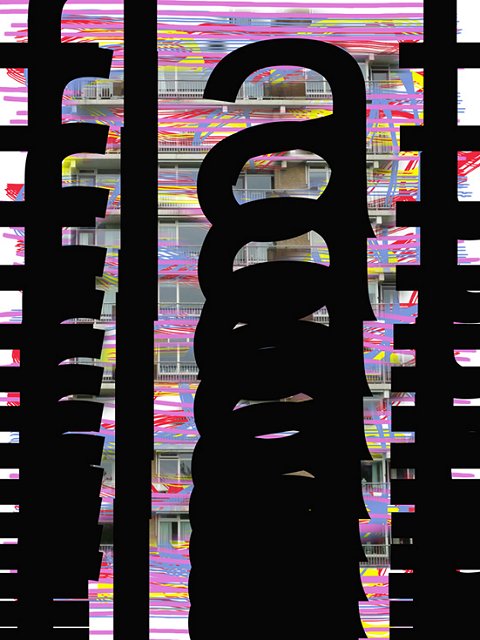
Freda Kamphuis © FLAT 2013
kempis.nl poetry magazine
More in: Freda Kamphuis, Kamphuis, Freda
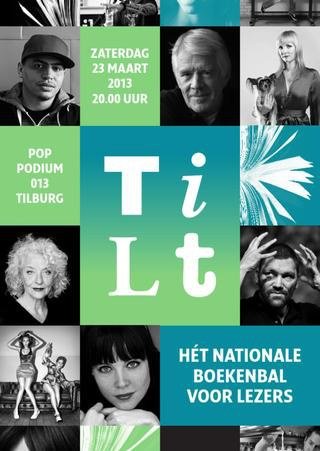
3e editie literaire festival TiLT op 23 maart 2013
Literair Variété Spektakel + Henk van Straten + Fresku + Kees van Kooten + Nelleke Noordervliet + Guus Kuijer + Jasper Henderson + Ellen Deckwitz + Delphine Lecompte + Christiaan Weijts + Jan van Mersbergen + Mark Verver + A.H.J. Dautzenberg + Thomas Möhlmann + Elfie Tromp + Goudzwartdebat + Esther Porcelijn en Tom America + VJ’s Studio M + DJ St. Paul + Thomése vs. Leeuwis vs. Neggers
Op zaterdag 23 maart 2013 vindt het literaire festival TiLT voor de derde keer plaats in Tilburg. TiLT staat voor Tilburg Literatuur & Theater. Maar ook voor deining, beweging, opschudding. En dat is precies wat het festival wil bewerkstelligen. Literatuur tot leven wekken. Boeken wakker schudden. Letteren koppelen aan andere disciplines. Muziek, film, beeldende kunst, theater. En dat allemaal in één prachtige avond. Een feest voor wie leest!
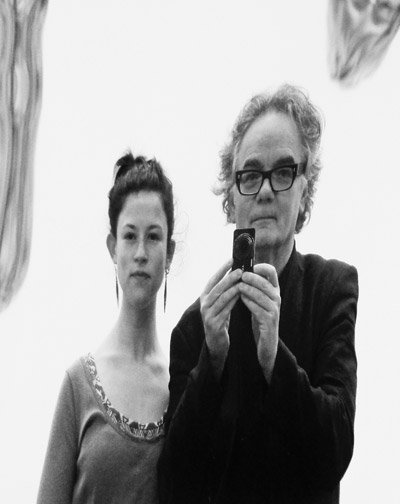
esther porcelijn & tom america
Het programma wordt dit jaar bruisender dan ooit! TiLT presenteert namelijk, in samenwerking met de CPNB, hét nationale slotfeest voor lezers in het laatste weekend van de Boekenweek. Op het programma pronken de schrijver van het Boekenweekgeschenk Kees van Kooten en Nelleke Noordervliet, schrijver van het Boekenweekessay. Ook bevestigd zijn; Guus Kuijer, Christiaan Weijts, Ellen Deckwitz, Mark Verver, Esther Porcelijn (Stadsdichter Tilburg) & Tom America, Anton Dautzenberg, P.F. Thomése, Leeuwis & Neggers, Delphine Lecompte en Thomas Möhlmann.
En een spetterende finale! Daarvoor zorgen Ivo Victoria en Rob Waumans met hun Groot Internationaal Literair Variété Spektakel. Een luchtig maar prikkelend programma vol snelinterviews (met o.a. Henk van Straten), kutrecensies, publieksparticipatie, een quiz, muziek en een mystery guest. En Fresku, de rappende revelatie van afgelopen jaar. Zij sluiten het festival af. Eén ding is zeker: het wordt een finale om niet licht te vergeten. Allemaal naar de Dommelsch Zaal!

fleursdumal.nl magazine
More in: A.H.J. Dautzenberg, Archive O-P, Art & Literature News, Elfie Tromp, Lecompte, Delphine, Porcelijn, Esther, The talk of the town, THEATRE, Tilt Festival Tilburg, Tom America
James Joyce
(1882-1941)
Clay
The matron had given her leave to go out as soon as the women’s tea was over and Maria looked forward to her evening out. The kitchen was spick and span: the cook said you could see yourself in the big copper boilers. The fire was nice and bright and on one of the side-tables were four very big barmbracks. These barmbracks seemed uncut; but if you went closer you would see that they had been cut into long thick even slices and were ready to be handed round at tea. Maria had cut them herself.
Maria was a very, very small person indeed but she had a very long nose and a very long chin. She talked a little through her nose, always soothingly: “Yes, my dear,” and “No, my dear.” She was always sent for when the women quarrelled Over their tubs and always succeeded in making peace. One day the matron had said to her:
“Maria, you are a veritable peace-maker!”
And the sub-matron and two of the Board ladies had heard the compliment. And Ginger Mooney was always saying what she wouldn’t do to the dummy who had charge of the irons if it wasn’t for Maria. Everyone was so fond of Maria.
The women would have their tea at six o’clock and she would be able to get away before seven. From Ballsbridge to the Pillar, twenty minutes; from the Pillar to Drumcondra, twenty minutes; and twenty minutes to buy the things. She would be there before eight. She took out her purse with the silver clasps and read again the words A Present from Belfast. She was very fond of that purse because Joe had brought it to her five years before when he and Alphy had gone to Belfast on a Whit-Monday trip. In the purse were two half-crowns and some coppers. She would have five shillings clear after paying tram fare. What a nice evening they would have, all the children singing! Only she hoped that Joe wouldn’t come in drunk. He was so different when he took any drink.
Often he had wanted her to go and live with them;-but she would have felt herself in the way (though Joe’s wife was ever so nice with her) and she had become accustomed to the life of the laundry. Joe was a good fellow. She had nursed him and Alphy too; and Joe used often say:
“Mamma is mamma but Maria is my proper mother.”
After the break-up at home the boys had got her that position in the Dublin by Lamplight laundry, and she liked it. She used to have such a bad opinion of Protestants but now she thought they were very nice people, a little quiet and serious, but still very nice people to live with. Then she had her plants in the conservatory and she liked looking after them. She had lovely ferns and wax-plants and, whenever anyone came to visit her, she always gave the visitor one or two slips from her conservatory. There was one thing she didn’t like and that was the tracts on the walks; but the matron was such a nice person to deal with, so genteel.
When the cook told her everything was ready she went into the women’s room and began to pull the big bell. In a few minutes the women began to come in by twos and threes, wiping their steaming hands in their petticoats and pulling down the sleeves of their blouses over their red steaming arms. They settled down before their huge mugs which the cook and the dummy filled up with hot tea, already mixed with milk and sugar in huge tin cans. Maria superintended the distribution of the barmbrack and saw that every woman got her four slices. There was a great deal of laughing and joking during the meal. Lizzie Fleming said Maria was sure to get the ring and, though Fleming had said that for so many Hallow Eves, Maria had to laugh and say she didn’t want any ring or man either; and when she laughed her grey-green eyes sparkled with disappointed shyness and the tip of her nose nearly met the tip of her chin. Then Ginger Mooney lifted her mug of tea and proposed Maria’s health while all the other women clattered with their mugs on the table, and said she was sorry she hadn’t a sup of porter to drink it in. And Maria laughed again till the tip of her nose nearly met the tip of her chin and till her minute body nearly shook itself asunder because she knew that Mooney meant well though, of course, she had the notions of a common woman.
But wasn’t Maria glad when the women had finished their tea and the cook and the dummy had begun to clear away the tea- things! She went into her little bedroom and, remembering that the next morning was a mass morning, changed the hand of the alarm from seven to six. Then she took off her working skirt and her house-boots and laid her best skirt out on the bed and her tiny dress-boots beside the foot of the bed. She changed her blouse too and, as she stood before the mirror, she thought of how she used to dress for mass on Sunday morning when she was a young girl; and she looked with quaint affection at the diminutive body which she had so often adorned, In spite of its years she found it a nice tidy little body.
When she got outside the streets were shining with rain and she was glad of her old brown waterproof. The tram was full and she had to sit on the little stool at the end of the car, facing all the people, with her toes barely touching the floor. She arranged in her mind all she was going to do and thought how much better it was to be independent and to have your own money in your pocket. She hoped they would have a nice evening. She was sure they would but she could not help thinking what a pity it was Alphy and Joe were not speaking. They were always falling out now but when they were boys together they used to be the best of friends: but such was life.
She got out of her tram at the Pillar and ferreted her way quickly among the crowds. She went into Downes’s cake-shop but the shop was so full of people that it was a long time before she could get herself attended to. She bought a dozen of mixed penny cakes, and at last came out of the shop laden with a big bag. Then she thought what else would she buy: she wanted to buy something really nice. They would be sure to have plenty of apples and nuts. It was hard to know what to buy and all she could think of was cake. She decided to buy some plumcake but Downes’s plumcake had not enough almond icing on top of it so she went over to a shop in Henry Street. Here she was a long time in suiting herself and the stylish young lady behind the counter, who was evidently a little annoyed by her, asked her was it wedding-cake she wanted to buy. That made Maria blush and smile at the young lady; but the young lady took it all very seriously and finally cut a thick slice of plumcake, parcelled it up and said:
“Two-and-four, please.”
She thought she would have to stand in the Drumcondra tram because none of the young men seemed to notice her but an elderly gentleman made room for her. He was a stout gentleman and he wore a brown hard hat; he had a square red face and a greyish moustache. Maria thought he was a colonel-looking gentleman and she reflected how much more polite he was than the young men who simply stared straight before them. The gentleman began to chat with her about Hallow Eve and the rainy weather. He supposed the bag was full of good things for the little ones and said it was only right that the youngsters should enjoy themselves while they were young. Maria agreed with him and favoured him with demure nods and hems. He was very nice with her, and when she was getting out at the Canal Bridge she thanked him and bowed, and he bowed to her and raised his hat and smiled agreeably, and while she was going up along the terrace, bending her tiny head under the rain, she thought how easy it was to know a gentleman even when he has a drop taken.
Everybody said: “0, here’s Maria!” when she came to Joe’s house. Joe was there, having come home from business, and all the children had their Sunday dresses on. There were two big girls in from next door and games were going on. Maria gave the bag of cakes to the eldest boy, Alphy, to divide and Mrs. Donnelly said it was too good of her to bring such a big bag of cakes and made all the children say:
“Thanks, Maria.”
But Maria said she had brought something special for papa and mamma, something they would be sure to like, and she began to look for her plumcake. She tried in Downes’s bag and then in the pockets of her waterproof and then on the hallstand but nowhere could she find it. Then she asked all the children had any of them eaten it — by mistake, of course — but the children all said no and looked as if they did not like to eat cakes if they were to be accused of stealing. Everybody had a solution for the mystery and Mrs. Donnelly said it was plain that Maria had left it behind her in the tram. Maria, remembering how confused the gentleman with the greyish moustache had made her, coloured with shame and vexation and disappointment. At the thought of the failure of her little surprise and of the two and fourpence she had thrown away for nothing she nearly cried outright.
But Joe said it didn’t matter and made her sit down by the fire. He was very nice with her. He told her all that went on in his office, repeating for her a smart answer which he had made to the manager. Maria did not understand why Joe laughed so much over the answer he had made but she said that the manager must have been a very overbearing person to deal with. Joe said he wasn’t so bad when you knew how to take him, that he was a decent sort so long as you didn’t rub him the wrong way. Mrs. Donnelly played the piano for the children and they danced and sang. Then the two next-door girls handed round the nuts. Nobody could find the nutcrackers and Joe was nearly getting cross over it and asked how did they expect Maria to crack nuts without a nutcracker. But Maria said she didn’t like nuts and that they weren’t to bother about her. Then Joe asked would she take a bottle of stout and Mrs. Donnelly said there was port wine too in the house if she would prefer that. Maria said she would rather they didn’t ask her to take anything: but Joe insisted.
So Maria let him have his way and they sat by the fire talking over old times and Maria thought she would put in a good word for Alphy. But Joe cried that God might strike him stone dead if ever he spoke a word to his brother again and Maria said she was sorry she had mentioned the matter. Mrs. Donnelly told her husband it was a great shame for him to speak that way of his own flesh and blood but Joe said that Alphy was no brother of his and there was nearly being a row on the head of it. But Joe said he would not lose his temper on account of the night it was and asked his wife to open some more stout. The two next-door girls had arranged some Hallow Eve games and soon everything was merry again. Maria was delighted to see the children so merry and Joe and his wife in such good spirits. The next-door girls put some saucers on the table and then led the children up to the table, blindfold. One got the prayer-book and the other three got the water; and when one of the next-door girls got the ring Mrs. Donnelly shook her finger at the blushing girl as much as to say: 0, I know all about it! They insisted then on blindfolding Maria and leading her up to the table to see what she would get; and, while they were putting on the bandage, Maria laughed and laughed again till the tip of her nose nearly met the tip of her chin.
They led her up to the table amid laughing and joking and she put her hand out in the air as she was told to do. She moved her hand about here and there in the air and descended on one of the saucers. She felt a soft wet substance with her fingers and was surprised that nobody spoke or took off her bandage. There was a pause for a few seconds; and then a great deal of scuffling and whispering. Somebody said something about the garden, and at last Mrs. Donnelly said something very cross to one of the next-door girls and told her to throw it out at once: that was no play. Maria understood that it was wrong that time and so she had to do it over again: and this time she got the prayer-book.
After that Mrs. Donnelly played Miss McCloud’s Reel for the children and Joe made Maria take a glass of wine. Soon they were all quite merry again and Mrs. Donnelly said Maria would enter a convent before the year was out because she had got the prayer-book. Maria had never seen Joe so nice to her as he was that night, so full of pleasant talk and reminiscences. She said they were all very good to her.
At last the children grew tired and sleepy and Joe asked Maria would she not sing some little song before she went, one of the old songs. Mrs. Donnelly said “Do, please, Maria!” and so Maria had to get up and stand beside the piano. Mrs. Donnelly bade the children be quiet and listen to Maria’s song. Then she played the prelude and said “Now, Maria!” and Maria, blushing very much began to sing in a tiny quavering voice. She sang I Dreamt that I Dwelt, and when she came to the second verse she sang again:
I dreamt that I dwelt in marble halls With vassals and serfs at my side, And of all who assembled within those walls That I was the hope and the pride.
I had riches too great to count; could boast Of a high ancestral name, But I also dreamt, which pleased me most, That you loved me still the same.
But no one tried to show her her mistake; and when she had ended her song Joe was very much moved. He said that there was no time like the long ago and no music for him like poor old Balfe, whatever other people might say; and his eyes filled up so much with tears that he could not find what he was looking for and in the end he had to ask his wife to tell him where the corkscrew was.
James Joyce stories
kempis.nl poetry magazine
More in: Joyce, James, Joyce, James
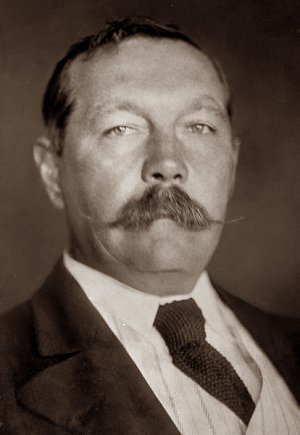
Arthur Conan Doyle
(1859-1930)
A Woman’s Love
I am not blind I understand;
I see him loyal, good, and wise,
I feel decision in his hand,
I read his honour in his eyes.
Manliest among men is he
With every gift and grace to clothe
him;
He never loved a girl but me —
And I I loathe him! loathe him!
The other! Ah! I value him
Precisely at his proper rate,
A creature of caprice and whim,
Unstable, weak, importunate.
His thoughts are set on paltry gain —
You only tell me what I see —
I know him selfish, cold and vain;
But, oh! he’s all the world to me!
Arthur Conan Doyle poetry
kempis.nl poetry magazine
More in: Archive C-D, Arthur Conan Doyle, Doyle, Arthur Conan
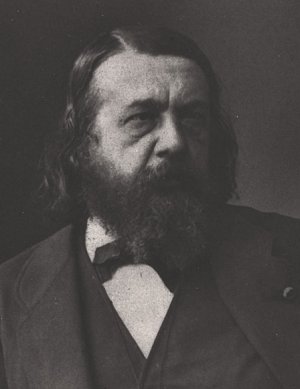
Théophile Gautier
(1811-1872)
Coquetterie posthume
Quand je mourrai, que l’on me mette,
Avant de clouer mon cercueil,
Un peu de rouge à la pommette,
Un peu de noir au bord de l’oeil.
Car je veux dans ma bière close,
Comme le soir de son aveu,
Rester éternellement rose
Avec du kh’ol sous mon oeil bleu.
Pas de suaire en toile fine,
Mais drapez-moi dans les plis blancs
De ma robe de mousseline,
De ma robe à treize volants.
C’est ma parure préférée ;
Je la portais quand je lui plus.
Son premier regard l’a sacrée,
Et depuis je ne la mis plus.
Posez-moi, sans jaune immortelle,
Sans coussin de larmes brodé,
Sur mon oreiller de dentelle
De ma chevelure inondé.
Cet oreiller, dans les nuits folles,
A vu dormir nos fronts unis,
Et sous le drap noir des gondoles
Compté nos baisers infinis.
Entre mes mains de cire pâle,
Que la prière réunit,
Tournez ce chapelet d’opale,
Par le pape à Rome bénit :
Je l’égrènerai dans la couche
D’où nul encor ne s’est levé ;
Sa bouche en a dit sur ma bouche
Chaque Pater et chaque Ave.
Théophile Gautier poetry
kempis.nl poetry magazine
More in: Archive G-H, Gautier, Théophile
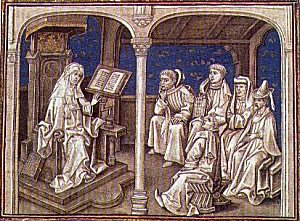
Christine de Pisan
(ca. 1364-1430)
Trés doulce dame, or suis je revenu
Trés doulce dame, or suis je revenu
Prest d’obeïr, s’il vous plait commander,
Comme vo serf vous me pouez mander.
J’ay longuement esté de joye nu
Hors du paÿs, mais, pour tout amender,
Trés doulce dame, or suis je revenu.
Mais je ne sçay s’il vous est souvenu
De moy qui vueil vous servir sanz tarder,
Et en espoir de vo grace garder,
Trés doulce dame, or suis je revenu.
Christine de Pisan poetry
kempis.nl poetry magazine
More in: Archive O-P, Pisan, Christine de
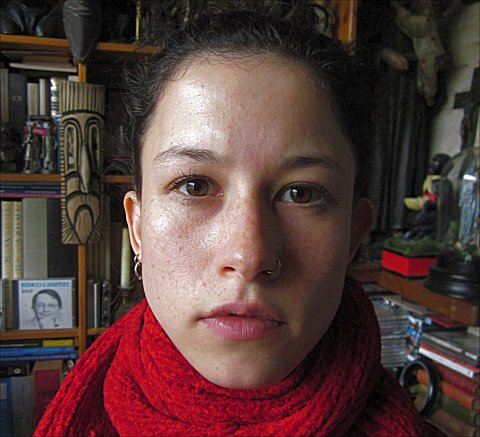
photo jef van kempen
Esther Porcelijn
Te vroeg voor chips
Het gaat zo beginnen, het is bijna op!
Zou iemand komen vertellen over slagschepen
Over hoe we met problemen dwepen?
Over wartaal, dansen en een mop?
Of over crème-bruléé of taartbak-tips!
‘t Is niet dat ik daar zin in heb hoor
Zegt Lidy tegen haar man, Theodoor.
Maar het is te laat voor muesli en te vroeg voor chips.
Het is rustig in de rest van het huis
De kat krabt aan een paal
Iedereen wacht op het verhaal
Van een man en zijn circusmuis
“Wat jij schat?” port Lidy aan
“Wat is het dat jij wil horen”
Hmm. Iets over dat Ajax heeft verloren.
Of het verliezen van een baan.
Ach lieverd, boeiend hoor!
maar dat komt morgen misschien
Nu gaat het over hoe mensen kunst zien
En ik hoef pas later naar kantoor!
De telefoon gaat. Lidy wiebelt even
Hé nu liever niet, geen crisis geen zin
Geen oplossingen, geen spanning in ’t gezin
Geen werk, daar is niets te beleven
Theodoor slaat een arm om haar heen
Legt zijn andere hand op haar been.
Boze telefoontjes moeten wachten
Ook de zee golft even niet, en geen van de natuurkrachten
Ik kan nu niet komen delegeren, tot mijn spijt
De wasmachine heeft geen toeren
De bouwvakkers staken het loeren
De AEX staat stil, want ja, koffietijd!
Op 7 Maart 2013 was Esther Porcelijn te gast bij het programma Koffietijd op RTL4 naar aanleiding van het winnen van de Hollands Maandblad aanmoedigingsprijs voor poëzie. Na een kort interview droeg zij een speciaal voor koffietijd geschreven gedicht voor.
Esther Porcelijn poetry
kempis.nl poetry magazine
More in: Porcelijn, Esther, Porcelijn, Esther

Henry Bataille
(1872-1922)
Le passé, c’est un second coeur qui bat en nous . . .
Le passé, c’est un second coeur qui bat en nous…
on l’entend, dans nos chairs, rythmer à petits coups,
sa cadence, pareille à l’autre coeur, -plus loin,
l’espace est imprécis où ce coeur a sa place,
mais on l’entend, comme un grand écho, néanmoins,
alimenter le fond de l’être et sa surface.
Il bat. Quand le silence en nous se fait plus fort
cette pulsation mystérieuse est là
qui continue… Et quand on rêve il bat encor,
et quand on souffre il bat, et quand on aime il bat…
Toujours ! C’est un prolongement de notre vie…
Mais si vous recherchez, pour y porter la main,
où peut être la source heureuse et l’eurythmie
de son effluve… Rien !… Vous ne trouverez rien
sous les doigts… Il échappe. Illusion… Personne
ne l’a trouvé jamais… Il faut nous contenter
d’en sentir, à coups sourds, l’élan précipité,
dans les soirs trop humains où ce grand coeur résonne.
Le passé! Quel mot vain! C’est du présent -très flou,
c’est du présent de second plan, et voilà tout.
Il n’est pas vrai que rien jamais soit effacé.
Le passé n’est jamais tout à fait le passé.
N’avez-vous pas senti comme il rôde partout,
et tangible ? Il est là, lucide, clairvoyant,
non pas derrière nous, comme on croit, mais devant.
L’ombre de ce qui fut devant nous se projette
sur le chemin qui va, sur l’acte qui s’éveille.
Ce qui est mort est encor là qui nous précède, –
comme le soir on voit, au coucher du soleil,
les formes qu’on avait peu à peu dépassées
envoyer leur grande ombre au loin, sur les allées,
sur tout votre avenir, plaines, taillis, campagnes !
Et s’en aller toucher de l’aile les montagnes…
Ainsi, tout ce qui fut, jeunesse, enfance, amour,
tout danse devant moi sa danse heureuse ou triste.
Rien derrière !… Le groupe est là qui vole et court.
Mais j’ai beau me hâter, la distance persiste
entre nous deux… Tel je m’en vais, épris du bleu
lointain, et quelquefois si je titube un peu
ce n’est pas que le sol sous mes pas se dérobe,
c’est que parmi le soir, les yeux plein de passé,
ô toi qui vas devant, Souvenir cadencé,
j’ai marché sur la traîne immense de ta robe !
Henry Bataille poetry
kempis.nl poetry magazine
More in: Archive A-B, Bataille, Henry
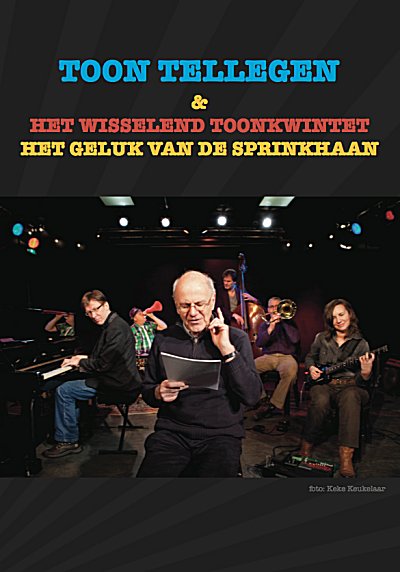
Nieuwe cd en tour Toon Tellegen & het Wisselend Toonkwintet
Op 13 maart wordt het nieuwe luisterboek Het geluk van de sprinkhaan van Toon Tellegen & het Wisselend Toonkwintet gepresenteerd op het BrokkenBal in het Bimhuis, en tevens het startschot gegeven voor de tournee door Nederland en België. Op 14 maart is de première van Het geluk van de sprinkhaan in De Lindenberg Nijmegen.
Gitariste/componiste Corrie van Binsbergen organiseert sinds 2003 literaire concerten met schrijvers als Remco Campert, Kees van Kooten, Ramsey Nasr, Josse De Pauw en Toon Tellegen. Met Tellegen is een vaste groep ontstaan: Het Wisselend Toonkwintet. Sinds 2006 touren zij met groot succes langs de Nederlandse en Vlaamse theaters. De verhalen van Toon Tellegen vormen een onuitputtelijke bron van muzikale inspiratie voor Corrie van Binsbergen en het Wisselend Toonkwintet. Samen brengen zij een unieke mix van muziek en literatuur.
Het kwintet bestaat uit Albert van Veenendaal op piano, Alan Purves op percussie, Hein Offermans op contrabas, Joost Buis op trombone en lapsteel en Corrie van Binsbergen op gitaar.
De sprinkhaan, die aan de rand van het bos een winkel heeft, wil niets liever dan dat zijn klanten tevreden naar huis gaan. Daarom is hij altijd geopend en zorgt hij ervoor dat álles in voorraad is: van schubben en stekels tot wanhoop of zelfs een ander leven. Zijn dienstbaarheid wordt alleen op de proef gesteld als de duizendpoot nieuwe schoenen komt kopen. Maar ’s nachts, als zijn winkel dicht is en hij niet kan slapen, denkt hij na over zijn werk en zijn streven naar perfectie. Want er is nog zoveel meer dat hij wil verkopen: heeft hij huiselijkheid, eenvoud of gerede twijfel wel in huis?
Speellijst voorjaar 2013
13-03 20:30 Bimhuis Amsterdam BrokkenBal*
14-03 20:00 De Lindenberg Nijmegen (première)
16-03 19:00 Wilminktheater Enschede
17-03 16:00 Schouwburg Leuven (BE)
21-03 20:30 Dok Delft
22-03 20:15 De Warande Turnhout (BE)
23-03 20:15 Nacht van de Poëzie Utrecht**
27-03 20:30 Theater Bouwkunde Deventer
28-03 20:30 Toneelschuur Haarlem
29-03 20:30 De Toonzaal Den Bosch
01-04 15:00 De Tuin Leusden
03-04 20:00 Cultuurcentrum Hasselt (BE)
07-04 15:30 Rosa Spier Huis Laren
11-04 20:30 De Harmonie Leeuwarden
23-06 15:00 Zonnemaire Festival
*Voorproefje van het programma, tevens optredens van Kees van Kooten, Remco Campert en A.L. Snijders
** Aangepast programma
Meer informatie: www.corrievanbinsbergen.com
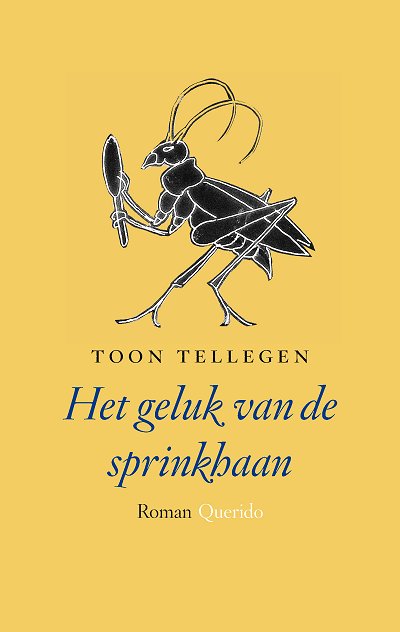
fleursdumal.nl magazine
More in: Archive S-T, The talk of the town, Toon Tellegen
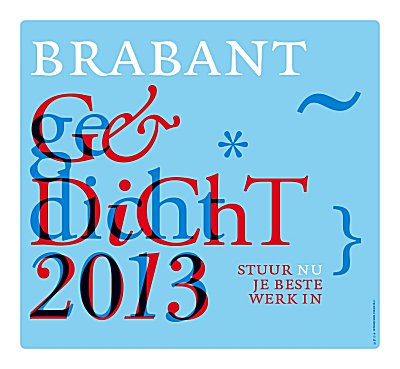
Gedichtenwedstrijd Brabant Gedicht nadert climax
Wie mag zich de beste Brabantse Dichter van 2013 noemen? Op zaterdag 16 maart komen we daar achter tijdens de finale van de internationale gedichtenwedstrijd Brabant Gedicht. In stadsBiEB Centrum betreden acht jonge dichters de poëtische arena tijdens een avondvullende literaire show en declameren hun mooiste poëzie.
Brabant Gedicht is een gedichtenwedstrijd voor jongeren tussen de 16 en 30 jaar, die in (Nederlands of Vlaams) Brabant geboren zijn of er wonen. Tijdens de zinderende finale op 16 maart dragen acht talentvolle dichters uit Nederland en België onder het toeziend oog van een deskundige jury voor uit eigen werk. De uiteindelijke winnaar van Brabant Gedicht 2013 mag zich een jaar lang ‘Beste Brabantse Dichter’ noemen, ontvangt een geldbedrag en is verzekerd van een podiumplaats tijdens het Geen Daden Maar Woorden Festival, dat in mei plaatsvindt in de Verkadefabriek.
Brabant Gedicht is een samenwerking van de bibliotheken in de zustersteden ‘s-Hertogenbosch en Leuven en wordt mede mogelijk gemaakt gemeente ‘s-Hertogenbosch.
Zaterdag 16 maart 2013
stadsBiEB Centrum, Hinthamerstraat 72 te ’s-Hertogenbosch
19.00 – 21.00 uur
toegang gratis
fleursdumal.nl magazine
More in: POETRY ARCHIVE, The talk of the town
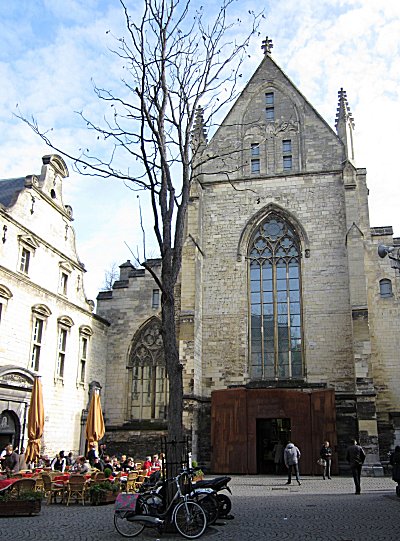
photo fleursdumal magazine
TON VAN REEN
NIEUWE ROMAN DE LICHTVERKOPER
Op donderdag 14 maart wordt de roman DE LICHTVERKOPER van Ton van Reen ten doop gehouden bij Boekhandel Dominicanen/Selexyz in Maastricht.
Maastricht in het jaar 1873. De twaalfjarige Casper Marres woont in de Cité Ouvrière, het mensenpakhuis dat grootindustrieel Petrus Regout voor arbeiders van zijn fabrieken heeft laten bouwen, dicht bij hun werk. Hoewel iedereen in het gezin Marres werkt, komen ze toch nauwelijks rond. De schatrijke Regout en de andere fabrieksdirecteuren worden in hun liberale overtuigingen gesteund door behoudende geestelijken die de arbeiders leren dat de macht wordt geschonken door God en dat de armen de rijken moeten accepteren.
Ton van Reen schreef dit boek om stem te geven aan de mensen die het slachtoffer waren van de hebzucht van de kleine groep industriëlen die kapitalen verdienden over de ruggen van hun arbeiders en hun gezinnen.
DE LICHTVERKOPER verscheen vanaf 1 december tot 16 maart als dagelijks feuilleton in Dagblad De Limburger/Limburgs Dagblad.
Programma:
-Welkomstwoord door locatiemanager Ton Harmes van Dominicanen/Selexyz
-Vraaggesprek over het boek met Ton van Reen door de Maastrichtse schrijfster Emma Crebolder
-Gesprek met Louis Sohl, nazaat van de fotografenfamilie Sohl
-Woord Huub Paulissen, hoofdredacteur van Dagblad De Limburger/Limburgs Dagblad
-Aanbieding eerste boeken door Huub aan Louis Sohl en Ton van Reen
-Ton beantwoordt eventuele vragen uit het publiek en signeert de boeken.
Aanvang: 19.30 uur
Adres: Boekhandel Dominicanen/Selexyz
Dominikanerkerkstraat 1, 6211 CZ Maastricht
Tel: 043-3040130 e: klantenservice.dominicanen@selexyz.nl
Voor vragen aan de uitgever: Pieter Jan Engelen, Manager Oplage Media Groep Limburg: p.engelen@mgl.nl Uitgever: Mooi Limburgs Boekenfonds, onderdeel van Media Groep Limburg
DE LICHTVERKOPER: ISBN 978-90-8596-090-4
In de boekenweek signeert Ton van Reen ook bij Boekhandel Bruna Helden-Panningen (vrijdag 15 maart, van 19.30 tot 21.00 uur), Boekhandel Leeskunst Kerkrade (donderdag 21 maart, van 19.00 tot 21.00 uur) en bij Boekhandel Koops Venlo (zaterdag 23 maart, van 14.00 tot 16.00 uur)
fleursdumal.nl magazine
More in: Reen, Ton van, Ton van Reen
Thank you for reading Fleurs du Mal - magazine for art & literature